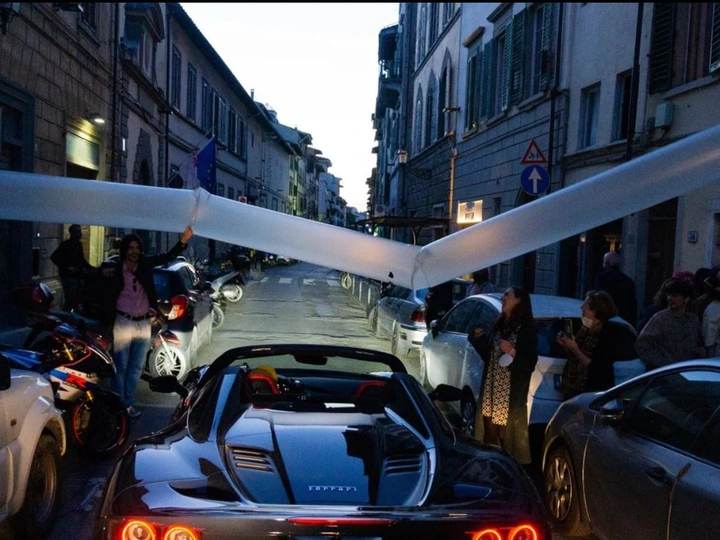This is Public Space!?

Francesco Caneschi (1990) was born in Firenze (IT). He's an urban practitioner that works across public space, art and research. His PhD project is an action-research, and it is titled: “Glocal Tools. Temporary urban actions for the collective production of space”.
He is author and co-author of many publications and several interventions in public spaces.
He participated in various workshops by Orizzontale, in the beginning as a participant and later as a researcher and assistant. Orizzontale (IT), Meanwhile Spaces (UK) and the NYC Plaza Program (USA) are the three case studies of his PhD project. He’s the curator of the archive of Titti Maschietto, co-founder of the radical architecture group UFO.
In 2021 he wrote a book titled "Tactical Urbanism and DIY architecture for a gentle urban revolution". He wrote several articles and participated in several international conferences about public space in the following field: temporary urban regeneration, the social fabric in historic-touristic cities and urban commons.
He believes that theory is a set of tools to be used in practice, and that their union is celebrated through communication.
He was an Arquia Foundation intern at Aires Mateus Associados in Lisbon. He participated, as a researcher selected by the Rectorate of the University of Aveiro (UA), in the Tactical Master Plan of the UA Campus. In 2018, he obtained his Master Degree in Architecture at FAUP.
Recently, he has been selected for the incubation program Social Tides Aspire Italy, and he has won the program Smart & Coop, organized by Impact Hub Florence and CR Firenze Foudation, to create a cooperative of architects and designers. The practice is based on a space that is both a design office and a carpentry workshop.
From 2014 to 2016, he co-founded and worked with the collective ab-USO, with which he developed several projects in public and common spaces
His research interests: radical architecture and incremental urbanism.
This is a happening that I designed and curated at the Street Level Gallery for the final event of Urbanscapes, in Florence. The event was composed by five elements: the survey titled “Public Space!?”, four small talks by urban practitioners, a text titled Gated Urbanism published on the website of the Gallery, an exhibition of provocative architectural collages and an interactive inflatable installation.
The main focus of the event was filling out the survey "Spazio pubblico!?, that is a contemporary version of the “Questionario di Prossemica Territoriale” written by UFO and published by Umberto Eco in “From the periphery of the empire”. The survey can become, according to Eco, a work of non-literature and at the same time an open work. During the event, the participants were engaged in small groups to debate about single questions, and in the end all the participants were involved in a collective debate about the most controversial questions. The final debate transformed the gallery into a public space, where participants confronted each other about fundamental questions regarding their daily lives in Florence. The survey changes in different sites.
The collages were signed Casabelva, a brandalist project that I co-founded. The filing of the survey was interrupted by short presentations of four different urban practitioners: Titti Maschietto and Patrizia Cammeo recounted the subversive activity of UFO during 1968, Olivia Gori presented the public designs of Ecòl and Jacopo Ammendola analysed the public space regulations in Florence.
In the end two Urboeffimeri were inflated to bring all the participants in the street, to play spontaneously and collectively in the public space.
Today it's not usual to discuss what public space is and participation processes are often organized by political parties with a strict agenda. The survey and the inflatable installation invite people to explore, theoretically and practically, what public space is and should be.